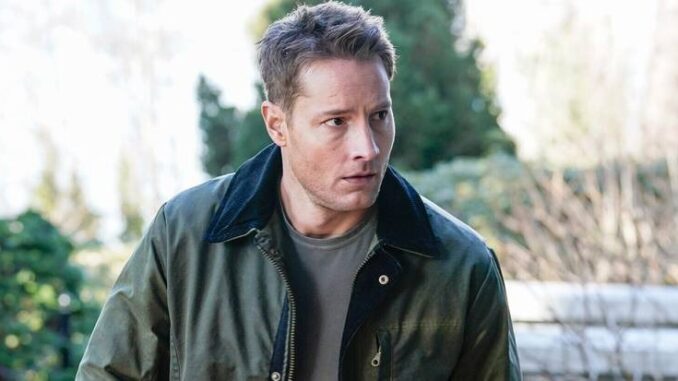
Although Tracker was a major hit for CBS right out of the gate, the show continues to fight for its own unique voice during Colter Shaw’s (Justin Hartley) television hiatus. Just as there were some cast shakeups between the first and second seasons, so too are there now between Seasons 2 and 3, which axed half the show’s cast ahead of the upcoming fall premiere. What does this mean for Tracker going forward? It’s hard to say, but producer and showrunner Elwood Reid has some thoughts about why this was a necessary change for the show and how this will ultimately benefit Colter in the long run. As it turns out, Reid is right, even if it’s hard to say goodbye.
‘Tracker’ May Be Better Off Focusing More on Colter Shaw’s Abilities. As expressed by Us Magazine, Tracker showrunner Elwood Reid spoke about the season-by-season cast shakeups on the series, which have been prevalent even before the series first aired. Back when the show was still called The Never Game, Mary McDonnell was originally cast as Colter’s mother, Mary Dove Shaw, in a recurring role that would’ve played a bigger part in the series. But before the show even aired, McDonnell left the project, and Wendy Crewson was cast instead. Likewise, after the first season, Robin Weigert left Tracker unexpectedly, and after having been gone for a chunk of Season 2 anyway, now Eric Graise (along with Abby McEnany) is on his way out. “It’s one of those things where actor availability is always an issue,” Reid explained. “There have been shows where people don’t even notice [if a character is missing].” Except for perhaps Graise’s Bobby (who has become a fan-favorite), the showrunner is absolutely right.
Folks may not have recognized this at the time, but the last four episodes of Season 1 didn’t feature Velma (McEnany) or Teddi (Weigert) in any capacity. The Bruins were simply gone from the narrative, and Colter was handling cases on his own, with Reenie (Fiona Rene) and Bobby’s occasional help, not to mention his brother Russell (Jensen Ackles). And, there’s no denying that Teddi’s Season 2 absence didn’t change the show’s dynamic in the slightest. If anything, it proved to Justin Hartley that Colter Shaw should be a bit more independent than the show has let him be. “I don’t want the show to be phone-a-friend every week,” Reid admitted to the outlet. “I think that gets old, and Justin [Hartley] is always challenging me on that. He’s like, ‘Do we need to do this? Do I need to call Bobby all the time? Can I do this?’”
As much as we love some of these supporting characters, Hartley and Reid are spot on in their Tracker assessment. Focusing so much of Tracker’s energy on expanding some of these additional characters takes away from the magic that is Colter on the job — and, although we’re not ready for that conversation quite yet, that includes Reenie too. Colter Shaw at work in different towns and cities across the country is where the show especially thrives, and it’s the idea that Colter can make new friends along the way (anywhere he’s working, really) that’s perhaps most effective.
This isn’t to say that the show cannot benefit from recurring characters; it clearly has. Even Reid has expressed his plans to expand Reenie’s role going forward, but as much as it pains us to admit it, we don’t need several members of Team Shaw to get the job done. There’s a reason that Colter is portrayed as self-sufficient.
CBS’s hit series Tracker has taken audiences by storm, fueled by Justin Hartley’s magnetic performance as Colter Shaw. While ensemble casts usually define modern television, Tracker dares to rely heavily on a single character. And guess what? It works. Some might even argue the supporting cast is less of a necessity and more of a distraction. In this hot take, we’ll explore why Tracker thrives with Hartley front and center and why the supporting cast may not be as crucial as many assume.
The Core of ‘Tracker’: Colter Shaw’s Solo Journey
At its heart, Tracker is built around Colter Shaw. He’s a lone-wolf survivalist who thrives in the wilderness, solving mysteries and finding missing people. The storytelling thrives on isolation, grit, and resourcefulness. Do we really need side characters crowding the stage when the protagonist himself is the magnet?
Why Colter Shaw Works Without Extra Help
Colter Shaw is not your typical TV hero. He’s intelligent, resourceful, and emotionally layered. His appeal lies in his independence. Audiences connect with him precisely because he doesn’t need constant backup or comic relief — he is the story.
The Supporting Cast: Helpful or Just Filler?
Sure, side characters add occasional flavor, but do they elevate the narrative? Often, the supporting cast seems designed to explain things the audience already understands. That slows the momentum. Let’s be real — fans are tuning in for Colter Shaw, not his background players.
A Show About Survival Should Feel Isolated
Think about it: survival stories shine when the protagonist is forced to rely on themselves. Whether it’s Bear Grylls in the wild or Cast Away’s Tom Hanks with a volleyball, the thrill comes from watching a single figure face challenges alone. Tracker fits that mold perfectly. Adding too many voices only waters down the tension.
The Risk of Overcrowding Storylines
TV networks love ensemble casts because they create subplots and keep episodes fresh. But with Tracker, the opposite is true. More characters often mean unnecessary drama that shifts focus away from Colter’s journey. And let’s be honest — viewers are here for the hunt, not for someone’s office politics or personal life.
Justin Hartley’s Star Power Is Enough
Let’s not underestimate Hartley. After years on This Is Us, he’s proven he can anchor a show with charisma alone. His performance keeps audiences invested. Why dilute that with characters who don’t add equal weight?
Fans Already Know Who They’re Rooting For
When you ask viewers what they love most about Tracker, the answer is almost always the same: Colter Shaw. The supporting cast rarely comes up in fan conversations. That’s a telling sign — the audience has chosen their hero, and it isn’t a group effort.
Comparisons to Other Lone-Wolf Dramas
Other shows like The Mandalorian and Sherlock thrive by focusing on one central figure. While they occasionally bring in sidekicks, the narrative always circles back to the lead. Tracker works best in that same mold — lean, sharp, and protagonist-driven.
Supporting Cast as a Safety Net
Networks often add supporting characters as a safety net — just in case the lead isn’t strong enough. But Tracker proves that isn’t necessary. With Hartley, the net is irrelevant. He’s the trapeze artist who doesn’t need it.
The Danger of Diluting the Brand
When a show like Tracker tries to give everyone a storyline, it risks losing what makes it unique. Colter Shaw is the brand. Too much focus on others could turn the series into yet another formulaic ensemble drama.
What the Supporting Cast Actually Brings
To be fair, the supporting characters sometimes serve as plot devices — providing information, adding a lighter tone, or showing Colter’s human side. But these are add-ons, not essentials. The show could function just fine without them.
A Minimalist Approach Could Elevate the Show
Imagine a tighter version of Tracker where every scene pushes Colter forward. No detours, no filler — just Shaw against the odds. That streamlined approach could elevate the series into something truly iconic.

Audience Connection: Less Is More
Viewers love intimate storytelling. When the focus stays on one character, audiences feel a stronger bond. By stripping away excess, Tracker allows fans to walk side by side with Colter, sharing every risk and victory.
The Future of ‘Tracker’ Without the Cast
If CBS leaned into Colter Shaw’s solo journey, Tracker could break away from the pack of procedural dramas. It would stand out as a survivalist thriller led by one man’s wits, not a group dynamic.
Conclusion
Here’s the bottom line: Tracker doesn’t really need its supporting cast. Justin Hartley is more than enough to carry the show, and the stories are strongest when Colter Shaw stands alone. While side characters may have their moments, the series shines brightest when it stays true to its lone-wolf roots. Sometimes, less really is more.